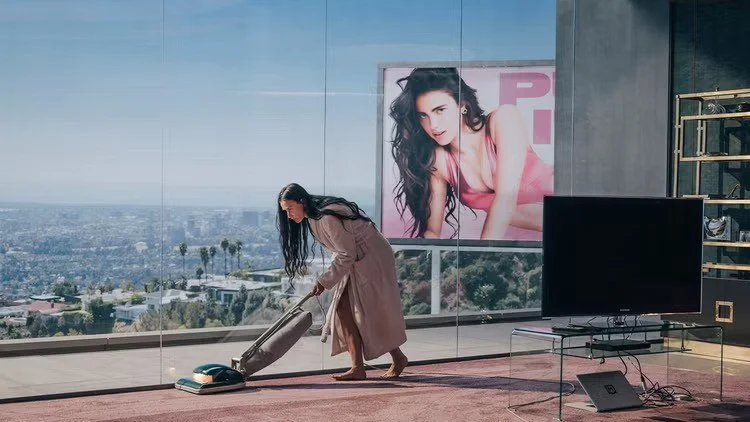Demi Moore Losing the Oscar to a 25-Year-Old Proves 'The Substance’s' Point—And It’s Not Just Hollywood
Demi Moore’s “Elisabeth” in contrast with Margaret Qualley’s “Sue” in “The Substance”.
The Oscars are more than just an awards show—they are a cultural barometer. Every year, we watch in awe as Hollywood’s finest gather, revealing their hopes, their craft, and their vulnerability. This year, many of us were rooting for Demi Moore, a veteran actress finally receiving recognition for her powerhouse performance in The Substance. Winning the Golden Globe had set her up as the clear front-runner for the Oscar, making us believe that, at long last, her decades of work would be rewarded. But when the envelope was opened, the award went to 25-year-old Mikey Madison for Anora instead.
While Madison delivered an incredible performance and deserved the honor, the irony was not lost on anyone. The Substance, after all, critiques the very thing that unfolded before our eyes: the media’s prioritization of youth and beauty over experience and longevity. Hollywood’s obsession with fresh faces is nothing new, but this moment felt like life imitating art in a painfully literal way.
The Dating Market Mirrors Hollywood’s Fixation on Youth
This phenomenon isn’t exclusive to Hollywood—it’s deeply ingrained in the dating and relationship landscape, especially within the South Asian community. Women are constantly pressured to maintain unrealistic beauty standards, and youth is treated as a currency. South Asian men, influenced by Bollywood and now social media platforms like TikTok, often expect their partners to meet impossible ideals: flawless skin, a toned physique, long flowing hair, and an effortless ‘natural’ beauty that ironically requires constant upkeep—yet they are often unwilling to acknowledge or invest in the effort it takes to achieve that look.
Meanwhile, Bollywood continues to cast 50-year-old male actors opposite 20-something actresses, reinforcing the idea that men can age gracefully while women are expected to remain frozen in time. This isn’t just a casting choice—it sends a clear societal message that men’s worth increases with age, while women’s declines. This bias translates directly into the South Asian dating market, where older men often feel entitled to significantly younger partners, while women in their 30s and beyond are deemed 'past their prime.'
Adding to the pressure is the rise of AI-generated beauty filters and hyper-realistic images that create an unattainable standard. Men scrolling through social media are constantly exposed to digitally perfected faces, leading to a warped perception of what real women look like. When their real-life dating experiences don’t match these AI-enhanced expectations, it creates dissatisfaction, unrealistic standards, and mismatches in dating.
Additionally, the fitness industry—often glamorized on TikTok and Instagram—promotes extreme diet culture and unattainable body goals. While staying healthy is important, the pressure for South Asian women to have an hourglass figure while maintaining traditional beauty standards creates an exhausting double bind. Women are expected to look effortlessly perfect while being criticized for any visible effort they put into achieving those standards.
The Harmful Effects of These Unrealistic Narratives
These expectations create a toxic dating culture where:
Women feel pressure to undergo cosmetic procedures, extreme dieting, or heavy makeup routines to meet societal beauty standards.
Men develop unrealistic preferences that prioritize aesthetics over compatibility and emotional connection.
Genuine relationships are overlooked in favor of superficial attraction, leading to dissatisfaction and insecurity on both sides.
Beauty is often equated with fertility, further reducing women to their biological function rather than valuing them as whole individuals with depth and character.
Women who prioritize their careers or personal growth over adhering to beauty standards often find themselves unfairly judged or deemed 'too ambitious' for the marriage market.
This cycle is exacerbated by social media, where filters, editing, and curated perfection distort reality. Young women feel pressured to conform, while older women are often dismissed, despite their wisdom, experience, and emotional maturity.
Women Supporting Women—The Key to Breaking the Cycle
Despite her loss, Demi Moore handled the moment with grace, publicly congratulating Mikey Madison and celebrating her win. Her response reminds us that true empowerment comes from uplifting one another, not competing in a game designed to make women feel replaceable.
Phillip Faraone//Getty Images Mikey Madison and Demi Moore at ELLE’s 2024 Women In Hollywood Celebration
South Asian women, in particular, need to champion each other rather than succumb to the pressures of comparison. When we reject the idea that only one woman can be the ‘most beautiful’ or the ‘most desirable,’ we challenge the very systems that attempt to diminish us. Rather than competing, women should encourage each other to embrace their natural beauty, pursue personal growth, and demand respect and appreciation beyond just their appearance.
Redefining Beauty and Value in Dating
It’s time we shift the narrative. Real beauty isn’t about youth alone—it’s about confidence, self-awareness, and emotional intelligence. The most fulfilling relationships are built on mutual respect, shared values, and deep connection—not just fleeting physical attraction.
So let Demi Moore’s Oscar snub be a wake-up call, not just for Hollywood, but for all of us. Let’s stop reducing women to their age and start appreciating them for their substance—whether in movies, in relationships, or in life.




